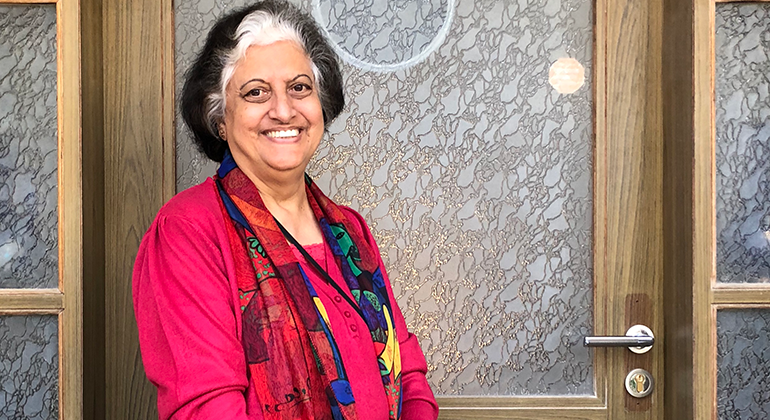“As a solidier in the Indian army, my father-in-law was posted to Iraq during the First World War. By 1919, after the War had ended, he made his way to Bahrain finding work as a boat mechanic. At that time Bahrain was in a state of progress and there were boundless opportunities.
I remember hearing stories about what life was like back then. In the 1920s business was done using the barter system and my mother-in-law became accustomed to her husband being paid in rice, chickens or even goats!
As devout Catholics, my husband’s father was instrumental in setting up the Catholic church in Bahrain. In the early years, he arranged for a priest to visit from Iraq to officiate weddings, baptisms and other ceremonies. As the community grew, so too did the desire for a permanent place of worship. By 1938 the Sacred Heart Catholic Church was established and by 1940, the Sacred Heart School. My husband and his siblings were amongst the first batch of students to attend.
My husband was one of ten children. He was born in Bahrain, was a Bahraini citizen and lived here his entire life until he passed away late last year. Like many of his generation, he only ever held one job, having worked at Cable & Wireless (now Batelco) from the age of 14 right up until his retirement. Whilst Bahrain was ‘home’ he was the first of his siblings to travel to India to explore his roots. And that is of course where he met me.
In 1964, as a young lady just shy of 20, I found myself on a ship heading to Bahrain to start a new life with my husband. I recall it took seven days to reach here. From Mumbai we sailed via Karachi, Muscat, Dubai and Doha to finally reach Manama. I don’t remember feeling perturbed. For a teenager it felt like the adventure of a lifetime!
I quickly settled into life here. In between work (at Gulf Air and Bahrain Royal Flight) and having three wonderful children, I occupied my time with social work through the Church. Unfortunately our youngest child was diagnosed with Brittle Bone Disease and although he was wheelchair-bound for much of his life, he had the determination to lead a full life. His ability to achieve all he wanted despite his health issues inspired me. We lost him several years ago, but being a mother to him made me stronger. He has a lot to do with the person I am today.
I see every life as being valuable. I think to do social work, you have to have that belief. You do the work not for glory, but because you genuinely believe that you can make a difference to someone’s life. I was one of the founding members of the Migrant Worker Protection Society (MWPS). In the 1990s, a few likeminded individuals joined together to help assist and advocate for expatriate workers who were experiencing difficulties. By 2005 we were licensed as a charitable society by the Ministry of Social Development. Thankfully the Government has always seen good in the work we do.
Since its inception, the MWPS has promoted basic standards in relation to pay and work conditions. Whilst there are still challenges ahead, it is heartening that both employers and workers are now more aware of the expected standards. It is also heartening that the police have become more aware of the types of cases we can help with. For example, when they come across someone with an immigration fine, they often start by calling us to see if we can help.
We rely on the goodness of volunteers and our benefactors. To each and every person who supports the Society, we are grateful. When I am helping a man or woman who is down on his or her luck, I put myself in their shoes. Whilst it is nice to be recognised (recipient of an award from the United States Department of State in 2008 for fighting human trafficking), I would never say that I’m doing anything out of the ordinary. I just do it with empathy.”


